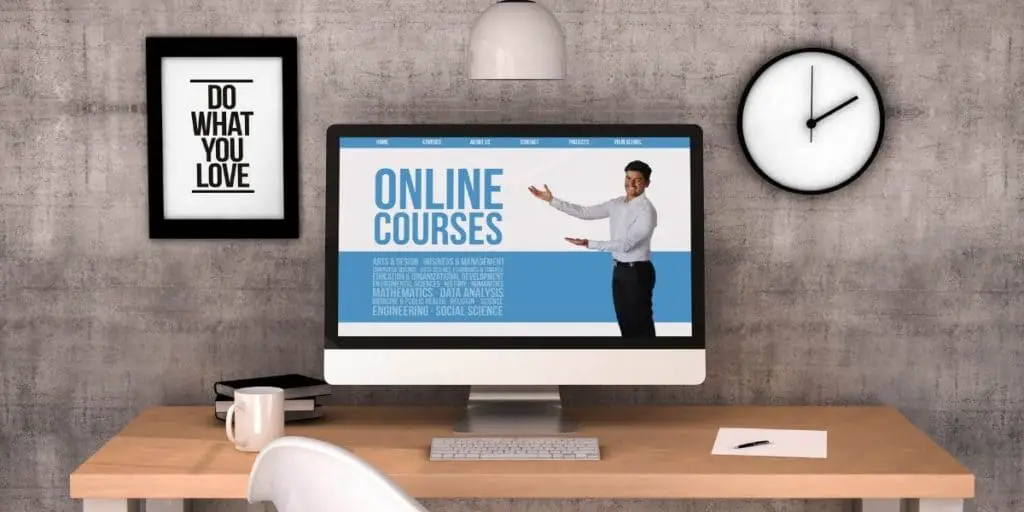As a forex beginner, you may be thinking about seeking expert advice and tuition about how the market works and how to enter and navigate it. So many forex “gurus” out there claim to make you rich overnight. But how reliable are they, and do forex courses work?
Forex courses work if they’re reliable and offered by experienced coaches. They teach you how to enter and work with the market, what currencies to trade, and many more. But be aware of false advertisements. And find a mentor who teaches you to execute real trades, rather than theoretical tips only.
In this article, we’ll further explain how forex courses can help you. We’ll elaborate on what to look for in a course to avoid scammers.
IMPORTANT SIDENOTE: I surveyed 1500+ traders to understand how social trading impacted their trading outcomes. The results shocked my belief system! Read my latest article: ‘Exploring Social Trading: Community, Profit, and Collaboration’ for my in-depth findings through the data collected from this survey!
Table of Contents
How Can Forex Courses Help?
Forex trading is a venture that needs extensive in-depth knowledge of the market, trading strategies, and risks. Not many people can afford to achieve this knowledge through experience, trial, and error since it could cost them all their capital. Getting help from a professional and experienced trader is the best thing you can do to lay the theoretical groundwork.

A forex trading course can guide you on the market basics, how different strategies work, how to minimize risks, predict market trends, and many more. It could even tell you how to find a reliable broker and how to avoid scams.
Most of these courses take you from the beginner to advanced levels, preparing you to trade in forex. If you have a basic understanding of the market, you could take individual training courses where a successful trader becomes your mentor. They’ll walk you through the actual process of placing trades and teach you the practical trading aspects rather than pure theories.
They allow you to work with a real person, hopefully, an experienced one, and ask them questions about things you don’t understand.
On the other hand, many wannabe traders decide to scam the unsuspecting and make money. The Internet is full of free and paid courses that promise to deliver 100% profits.
But be careful not to fall for a catchy ad trying to lure you into buying the course. Many forex beginners have fallen prey to the dubious courses making unrealistic claims. But if a trader can teach you the tricks to become a millionaire, why wouldn’t they keep the secrets to themselves and use them to hit the jackpot?
What To Look for in a Trading Course?
To avoid wasting your hard-earned money on fake courses, you need to do your homework and choose a reliable course that matches your needs.
If you decide to take a course in forex trading, look for these points:
Is the Course Reputable?
A good way to narrow down the thousands of options is to see how reputable the course is. Search their track records and talk to people who have taken these courses. You can easily find them on online forums.
Go through the course’s website and read their terms and conditions carefully. Pay attention to what they promise and beware of unreasonable vows. Steer clear of those who “guarantee to make you rich” since no one can do it for you.
Does It Have Certification?
Regulatory bodies oversee and certify trading courses. It can be a good safeguard proving the reliability of the course. These regulatory institutions have codes of ethics that trading courses must observe. For example, in the US, famous regulatory bodies are The Securities and Exchange Commission, The National Futures Association, and The Futures Industry Association.
How Do They Deliver the Course?
You could take online or offline courses depending on your time, budget, learning styles, and proficiency level.
For example, beginner students can learn more from online courses to receive educational videos, practical presentations, or manuals. Online courses give you enough time to learn at your own pace, fitting your time and learning style.
Some courses offer social platforms that help students get in touch and learn from each other. Some present the course through written materials, and some use audio as the main medium.
Look for educational tools that you’re more comfortable with and ones that can hold your attention through engaging and innovative teaching styles.
Who’s the Instructor?
Ask the vendor who’s teaching the course and search his background. If the person is an experienced forex trader, they’re more reliable and capable of passing on their hands-on experience.
Look for online reviews and cross-check with their past students. You should also check to see what percentage of the course the advertised instructor teaches. Can you access them to evaluate your progress and receive feedback?
What Do They Teach?
Even if you’re a complete beginner, you should know what you want in a course. Before taking the course, check to see if it can answer your questions and fits your needs. Make a list of all your expectations and carefully check the course content.
If the course provider is reliable, they’ll let you ask any questions that you might have. Check if the content is up-to-date, so it covers all the market changes.
And if you want to boost specific skills, go for individual courses with tailored content.
Do They Offer a Support Package?
Look for courses that offer an active and two-way learning venue. Instructors should let you ask questions and demand more explanation on any topic you don’t understand.
Plus, check to see if you can access the course after it’s over. That’s a crucial advantage since it helps you return to what you’ve learned and when you’ve started trading.
Alternatives to Forex Tutorials
Mastering forex trading is a huge commitment in terms of money and time. You can’t get around the time commitment because you’ll set yourself up for failure without learning the basics. However, you can avoid paying huge sums of money by looking for free or cheaper alternatives to forex courses.
Books
Books can be an inexpensive alternative to introductory courses and seminars. You can read books to learn about the market fundamentals. Reading books give you a general understanding of what approaches and orientations you’ll take. Then, you could use other complementary courses that match your approach.
Free Online Sources
There’s a sea of free online materials that can teach you everything you need to learn about forex. Join online forums and find forex traders willing to give you practical tips.
YouTube is an invaluable source that can give you tailored content. Many websites, such as babypips.com and Investopedia, offer free courses and educational material, perfect for novices.
When you’ve learned the basics, you can polish your knowledge by getting help from a professional trader and a paid course.
Demo Accounts
Most forex academies allow you to learn practically by using a demo account. It simulates the actual trading environment and helps you start trading without risking your money. You can get familiar with how the platform works, develop trading strategies, and find the best trading styles and routines. Plus, you can learn how to manage your emotions while getting more confident in this risky venture.

Author’s Recommendations: Top Trading and Investment Resources To Consider
Before concluding this article, I wanted to share few trading and investment resources that I have vetted, with the help of 50+ consistently profitable traders, for you. I am confident that you will greatly benefit in your trading journey by considering one or more of these resources.
- Roadmap to Becoming a Consistently Profitable Trader: I surveyed 5000+ traders (and interviewed 50+ profitable traders) to create the best possible step by step trading guide for you. Read my article: ‘7 Proven Steps To Profitable Trading’ to learn about my findings from surveying 5000+ traders, and to learn how these learnings can be leveraged to your advantage.
- Best Broker For Trading Success: I reviewed 15+ brokers and discussed my findings with 50+ consistently profitable traders. Post all that assessment, the best all round broker that our collective minds picked was M1 Finance. If you are looking to open a brokerage account, choose M1 Finance. You just cannot go wrong with it! Click Here To Sign Up for M1 Finance Today!
- Best Trading Courses You Can Take For Free (or at extremely low cost): I reviewed 30+ trading courses to recommend you the best resource, and found Trading Strategies in Emerging Markets Specialization on Coursera to beat every other course on the market. Plus, if you complete this course within 7 days, it will cost you nothing and will be absolutely free! Click Here To Sign Up Today! (If you don’t find this course valuable, you can cancel anytime within the 7 days trial period and pay nothing.)
- Best Passive Investment Platform For Exponential (Potentially) Returns: By enabling passive investments into a Bitcoin ETF, Acorns gives you the best opportunity to make exponential returns on your passive investments. Plus, Acorns is currently offering a $15 bonus for simply singing up to their platform – so that is one opportunity you don’t want to miss! (assuming you are interested in this platform). Click Here To Get $15 Bonus By Signing Up For Acorns Today! (It will take you less than 5 mins to sign up, and it is totally worth it.)
Conclusion
Forex courses are great sources of knowledge, coming from years of experience in forex trading. They can help newbies and experienced forex users equally to trade in a way that fits their trading styles and objectives.
However, you should always look out for fraudsters who have made fortunes by scamming enthusiastic novices.
Research extensively and carefully to ensure the course provider is reliable so that you don’t end up wasting your money.
BEFORE YOU GO: Don’t forget to check out my latest article – ‘Exploring Social Trading: Community, Profit, and Collaboration’. I surveyed 1500+ traders to identify the impact social trading can have on your trading performance, and shared all my findings in this article. No matter where you are in your trading journey today, I am confident that you will find this article helpful!
Affiliate Disclosure: We participate in several affiliate programs and may be compensated if you make a purchase using our referral link, at no additional cost to you. You can, however, trust the integrity of our recommendation. Affiliate programs exist even for products that we are not recommending. We only choose to recommend you the products that we actually believe in.
